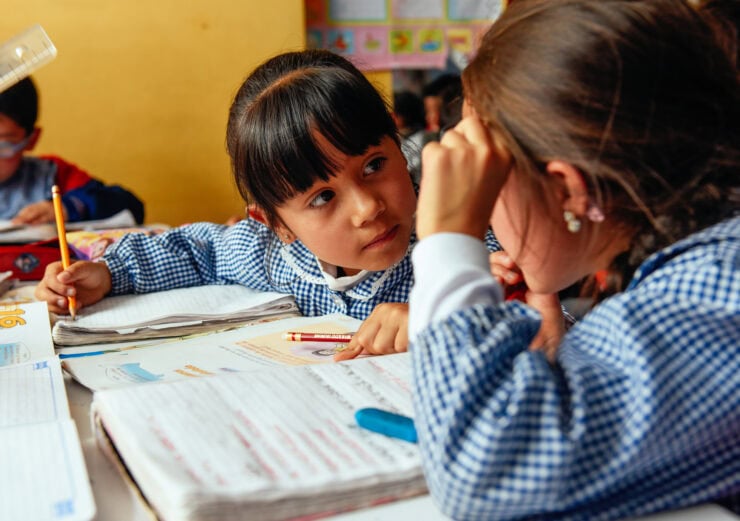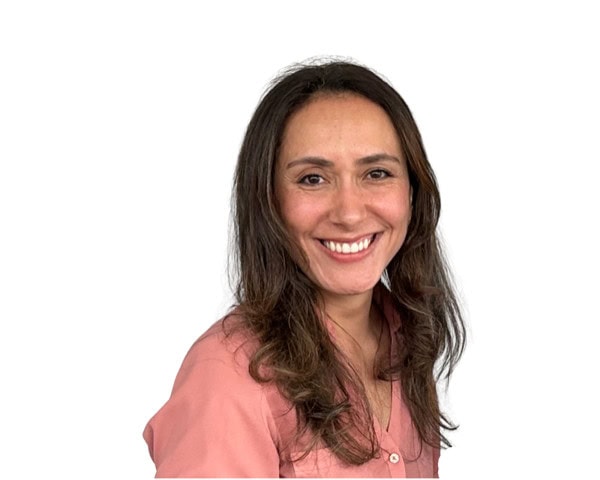A child-centered approach to education
How collaborative efforts and holistic education empower children

Families, communities, schools, and policymakers must work together to create caring environments that help children thrive, says Clarita Arboleda of the NGO Fundación Escuela Nueva. Clarita talks with Aisha Schnellmann about the urgent need for education reform in rural underserved regions, and how quality, holistic learning equips children for a brighter future.
Aisha Schnellmann: What are the biggest challenges facing children globally and in Latin America?
Clarita Arboleda: Children globally face significant challenges in accessing quality education, especially in low-income and conflict-affected regions. Conflict, displacement, and poverty often disrupt their education. Moreover, gender inequality disproportionately disadvantages girls in these regions.
In Latin America, children from low-income families continue to face significant barriers to quality education. These barriers are greater in rural areas and among marginalized groups, such as migrants and internally displaced persons, and perpetuate poverty, limit opportunities, and deepen social exclusion. Rural schools often lack proper infrastructure, trained teachers, and learning resources, making it difficult for them to meet the diverse needs of their students. In many schools, teachers manage students across multiple grade levels in one classroom, without adequate support or training for this type of setting.
“All children need schools that are more sensitive to their reality by being flexible, inclusive, and supportive.”
Migrant and internally displaced children struggle even more. All children need schools that are more sensitive to their reality by being flexible, inclusive, and supportive. Yet conventional schooling often fails to address students’ unique needs, such as stability and emotional support, to help them build their self-esteem and rediscover the joy of learning.
Traditional teaching methods that focus on transmitting knowledge rather than active engagement, critical thinking, and problem solving further hinder progress. Students are left unmotivated and ill-prepared for the future.
AS: What do children need to help them thrive?
CA: Children have various needs that must be met throughout all stages of their development. As the saying goes, it takes a village. Families, communities, schools, and policymakers must work together to create protective and caring environments that help children grow and thrive. Children need proper nutrition, healthcare, and safe, loving environments that offer security and stability. Emotional and psychosocial support is also fundamental for building self-esteem, confidence, and trust.
Equal access to quality education for all children is crucial. Engaging and inclusive learning environments help children develop their hearts and minds, teaching them skills that prepare them to live healthy, fulfilling lives. Positive relationships and role models are also vital to children’s wellbeing, as are opportunities for socialization, participation, and agency. Finally, encouragement and positive reinforcement help children develop autonomy and a growth mindset over time, enabling them to strive and succeed.
AS: How is the work of your NGO Fundación Escuela Nueva helping children in Colombia?
CA: We support the development and learning of underserved children, particularly in rural areas and among migrant or internally displaced populations. By providing quality education, we empower children to develop cognitive and socioemotional skills, equipping them to learn effectively and reach their full potential.
Our child-centered approach to learning moves beyond traditional teacher-centered methods to encourage active student participation and engagement. This approach fosters autonomy, responsibility, self-regulation, problem-solving, and critical thinking. Through cooperative learning strategies, students learn to work together, share ideas, disagree respectfully, and support one another. This promotes teamwork, empathy, communication, and conflict resolution skills.
“We recognize that each child has unique strengths, interests, and learning rhythms.”
We recognize that each child has unique strengths, interests, and learning rhythms. We train teachers to adapt instruction to the individual needs of students. We believe that children should advance from one unit to another at their own pace, and that teachers should carry out formative evaluations to ensure that every child has the opportunity to succeed.
For over 37 years, our efforts have helped children learn and develop. We help create effective and equitable educational systems that benefit all children, whatever their backgrounds, through transformative, evidence-based educational practices that have helped shape educational policy.
AS: What has inspired you in this work?
CA: I have been inspired by the real possibility of translating complex challenges into concrete, manageable actions. Positive change in the classroom and the school can be achieved through simple, replicable strategies. Our work empowers children, teachers, and parents to be the main drivers of that change.
“Positive change in the classroom and the school can be achieved through simple, replicable strategies.”
AS: What is your vision for children in the future?
CA: My vision is of a world in which all children, regardless of background and context, have equal opportunities to grow, learn, and reach their full potential. This means ensuring health, wellbeing, and safe, nurturing environments throughout their development.
It also involves honoring every child’s right to quality education that supports holistic growth – fostering not only academic achievement and cognitive growth, but also emotional, social, and physical development.
To that end, we are on a mission to equip young people with crucial skills, including critical thinking, problem solving, empathy, teamwork and decision making, while empowering them to lead with purpose, emotional intelligence, and resilience. By learning from challenges and failures, they can build a brighter future for themselves and their communities.
Footnotes
Clarita Arboleda holds a Bachelor’s degree in Business from Los Andes University in Colombia and a Master’s degree in International Education from New York University’s Steinhardt School of Culture, Education, and Human Development. Also at NYU, she gained further expertise through a Specialization in Nonprofit Management program. In addition, she completed the Social Entrepreneurship program at INSEAD.
With 20+ years of experience, she has been a key contributor at Fundación Escuela Nueva (FEN) and has played a pivotal role in driving the organization’s strategic growth. For the past 14 years, she has served as Chief Operating Officer, with responsibility for defining and executing organizational strategies, providing strategic leadership, and ensuring the alignment and smooth functioning of critical operational and programmatic functions. Additionally, she provides oversight to the Project Management Office (PMO), which centralizes the design, planning, execution, and evaluation of all projects.
FEN’s website, and FEN on Facebook, Youtube
Fundación Escuela Nueva is a recipient of the 2024 Klaus J. Jacobs Best Practice Prizes, which recognize institutions and individuals working to implement evidence-based solutions aimed at promoting child development and learning in practice.
This interview has been edited for clarity.

